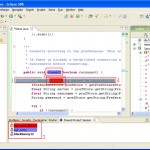A new version of Saros has been released today. Well done to the Saros team! (See my blog entry dated 25 November 2009 for some more information on Saros.)
Agile Methods
Accolade for Saros
Saros has just recently been named one of the best 30 Eclipse plugins by AjaxLine. Way to go Saros team!
No sooner do I join the team than Saros is winning accolades. Coincidence?… Well, yes actually. I’ve yet to contribute a thing so far!
An Introduction to Saros
I feel as though I am almost completely adjusted and acclimatised to my new surroundings, and furthermore I am now becoming fully immersed in my new work here at the Free University of Berlin (FU). Therefore, I think I can begin to introduce the new work I am now part of. My research concerns have now diversified a little: they continue to include FLOSS and empirical methods, but they also now encompass Agile Methods. Let me explain…
I am now part of Saros, an on-going project here at the Institute of Computer Science. Saros is a free/open source Eclipse plug-in that enables distributed collaborative software development within the Eclipse environment. Developers can work simultaneously on shared documents over a network, allowing concurrent access to geographically dispersed programmers. Changes made are instantaneously seen by all participants, and Saros makes it clear who made what changes.

The plugin is useful in a number of scenarios, such as collaborative development, joint code reviews, or knowledge transfer. But particularly cool, is the support for distributed pair programming, by allocating the roles of “driver” or “observer” to everyone involved. In time, more features will help Saros replicate the pair programming experience in a distributed environment.
It seems I have joined a project that is already thriving thanks to the hard work and dedication of both the researchers and the team of bachelors/masters students who have contributed to the software in the previous months. Feedback from users is coming in steadily, the number of downloads is now measurable in thousands, and there are a few “testimonials” to Saros from outside parties (locatable on the FU website).
And there is plenty of life left in the project because a steady stream of students continue to sign up to work on new aspects. Together with the existing team they have some exciting new features in the works that will enrich the feature set of Saros.
Why not go to the SourceForge page and try it out for yourself?